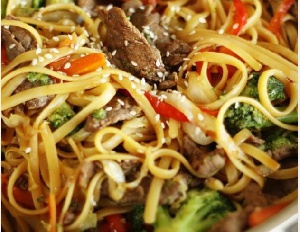Renowned human health Researcher and library assistant at the University of Ghana medical school korle bu, Effa Baffo Gyamfi has revealed that instant noodles are made of candle wax, causing lots of diseases in human and also leading to the increase in kidney failures in Ghanaians especially the growing generation.
He said this in an up close interview on Kantanka TV’s flagship program “NSEM” with Kobena Ebo Sam on the topic “The deadly foods we consume”, Mr. Baffo Gyamfi furiously revealed, children and youth of today are pruned to instant noodles and fast foods which are deadly to their health. He warned that Africans especially Ghanaians should desist from these foods to have a healthy nation.
He added that the oil in packs of noodles is made from residues and compounds of petrochemical products which are very harmful to human health.
Mr. Gyamfi buttressed his points with a scientific research by Smith Williams of the National Library of Medicine based in the United Kingdom (UK) saying, Waxes are poisonous. He references to a 7year old boy who died with a buildup of wax in his system as a result of eating instant noodles.
Organic agriculture will need to be significantly intensified in the next decades to continue providing natural foods to the growing global population he advised. Mr. Effa Baffo Gyamfi stated that the depopulate agenda against Africans has lead to the fusing of these foods in the country hence Ghanaians need to be vigilant in what they consume.
Mr. Gyamfi reiterated that most foods we consume are so deadly hence we should join Apostle Dr. Dr. Kwadwo Safo to promote his Organic food production campaign to save a healthy future for Ghana.
According to him, most imported consumables like tin tomatoes, perfume rice, baby formula foods, energy drinks, and frozen chickens among others are causing damage to our health and therefore the need to be avoided.
He concluded by adding that foods in cans are really causing of low sperm count, heart and kidney failure in men therefore the need to be cautious of what we consume to save lives
General News of Wednesday, 3 October 2018
Source: Kantaka TV













